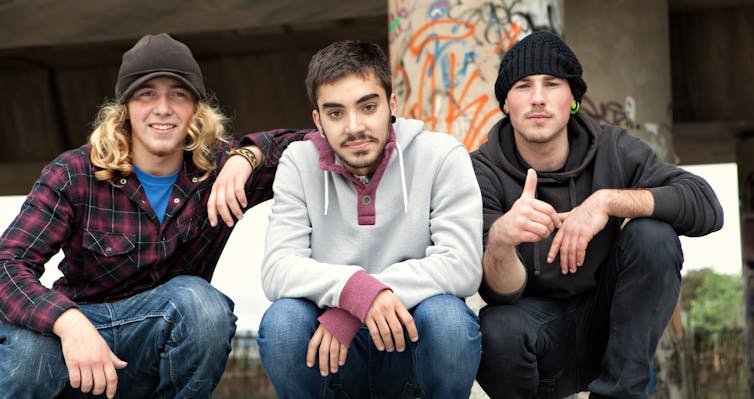Men are mentors in program for adolescent boys about healthy relationships and sexuality
This article is republished from The Conversation under a Creative Commons license. By Caroline Claussen, University of Calgary.
Social media campaigns such as #MeToo have brought tremendous attention to the issue of sexual violence in North American society, igniting the call for violence prevention programs that challenge traditional gender norms and promote healthy relationships.
Given the gendered nature of sexual and dating violence, targeting boys with these programs early in adolescence may provide an opportunity to shift core beliefs about masculinity, sexuality and violence.

Unfortunately, there is a lack of programming for boys, particularly interventions focused on promoting healthy and positive constructs of masculinity. Of those that do exist, there is limited evidence on whether they are effective. My doctoral research addresses this gap on engaging boys in masculinity issues and promoting healthy masculinity by examining the benefits of having participated in WiseGuyz, a male-only sexual health and healthy relationship program in Calgary.
Meet the WiseGuyz
The WiseGuyz program, run by non-profit agency The Centre for Sexuality (formerly known as the Calgary Centre for Sexual Health), is a school-based healthy relationship and sexual health program that targets boys in Grade 9 (ages 13 - 15) in several schools in the Calgary area. WiseGuyz consists of four core modules — healthy relationships, sexual health, gender and media and human rights — facilitated over 15 weekly, 90-minute sessions. Issues of sexuality, gender and relationships are explored.
Early in my doctoral program, I became aware of the potential for comprehensive school-based sexual health education as a way of engaging young men in gender equality and gender-based violence prevention efforts. The challenge with this approach, however, is that traditional, school-based sexual health education programs fail to consider ways in which gender ideologies contribute to sexual and dating violence. Years of research on sexual health education in schools also pointed to the fact that engaging boys can be incredibly difficult. Given these factors, I was curious how the WiseGuyz program managed to engage young men, and whether the program was producing positive outcomes.
Men as mentors
Building and maintaining a safe space is critical to the program’s ability to engage young men in challenging conversations. Focus groups with the boys identify how the program structure allowed them to feel safe and explore topics regarding sexuality and masculinity without the fear of being judged. Creating a sense of safety is important, as it supports an environment whereby the boys can begin to openly discuss masculine stereotypes, pressures and expectations.
The program is facilitated by men in their mid-20s to early 30s, whom boys in the program see as mentors, role models and friends. Having these kinds of facilitators is important, as young men from numerous studies say typical sex education is delivered by staff with limited credibility. By deliberately choosing young, socially relevant male facilitators, the centre has been able to engage program participants in conversations about sexuality, masculinity and relationships.
Supporting boys to critically reflect about gender is an important part of the program. According to boys, once they began to examine masculine norms and stereotypes, they began to understand how they were influenced by them. Young men speak about gaining greater awareness of the ways in which language is used to police behaviour. For example, one shared that “you don’t realise the destruction that it does” to be called derogatory names that challenge or question your masculinity.
Empowering boys towards healthy adulthood
Survey data collected in the program shows boys agree less with traditional masculinity ideologies after the program as compared to when they started the program.
Boys spoke about the way the program supported them to think about masculinity differently. For example, although boys may enter the program aware of the differences between themselves and other group members sometimes with negative judgment, during the program they appear to increase their respect for these differences. This can lead to a greater acceptance of a wider range of qualities and behaviours from both themselves and others.
My preliminary research suggests that WiseGuyz is a promising program in reducing boys’ endorsement of traditional masculinity ideologies that contribute to dating and sexual violence.
Providing boys with skills to address, examine and challenge beliefs around traditional masculinity ideologies allows young men to resist and re-define the highly gendered expectations they face regarding their identities and behaviours.
By empowering boys with the confidence and skills to resist societal constructions of masculinity, WiseGuyz is supporting the young men they work with to attain emotionally healthy adulthood.![]()
Caroline Claussen, Doctoral Candidate, Department of Sociology, University of Calgary
This article is republished from The Conversation under a Creative Commons license. Read the original article.
